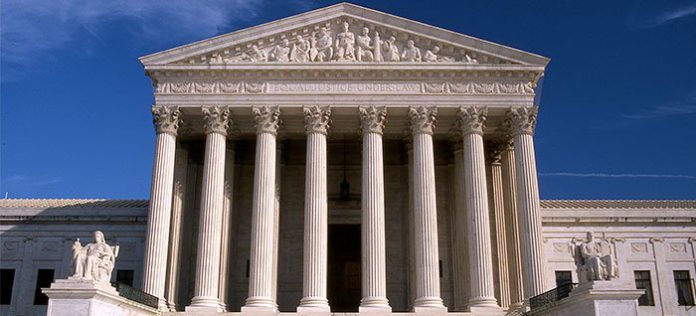

Last week, the U.S. Supreme Court issued a major decision over the timing of copyright infringement lawsuits.
On March 4, the Supreme Court settled a longstanding circuit split by holding that parties can only sue for infringement when they have registered the copyright. In some federal courts, plaintiffs could sue for copyright infringement even if they hadn’t yet completed registration for that copyright, but merely applied for it. The high court’s ruling in Fourth Estate Public Benefit Corp. v. Wall-Street.com, however, will have more content producers pay rush fees to register their works or else wait months for the chance to go after infringers.
Under federal copyright law, plaintiffs can’t file an infringement complaint until “registration of the copyright claim has been made.” The 5th and 9th Circuits, however, considered registration to have “been made” for a work once the claimant submitted an application and paid filing fees. That allowed media companies and other claimants to sue for infringement even as they waited for the Copyright Office to process the copyright registration. The Supreme Court, however, adopted the “registration approach” for copyright litigation, which had been picked up by several appellate courts including the 10th Circuit Court of Appeals in 2005.
In the underlying case, Fourth Estate licensed articles to Wall-Street.com. But after Wall-Street.com canceled the licensing agreement, Fourth Estate sued the site when it failed to take down Fourth Estate’s content. Fourth Estate brought the suit while it was still registering the copyrights for that content. The 11th Circuit, taking the registration approach, affirmed the complaint’s dismissal.
The high court agreed, reasoning that to “make registration” doesn’t mean applying for registration. The only sensible reading of the statute, the court held, was that “the phrase ‘registration … has been made’ refers to the Copyright Office’s act granting registration, not to the copyright claimant’s request for registration.”
Some media organizations decried the Fourth Estate ruling, saying it could leave their works vulnerable to infringement while they await the Copyright Office’s months-long processing for registration.
“This ruling allows administrative backlog to prejudice the timely enforcement of constitutionally based rights and prevents necessary and immediate action against infringement that happens at internet speed,” said Recording Industry Association of America CEO Mitch Glazier in a statement. “Given this ruling, the Copyright Office must also work at internet speed to ensure adequate enforcement protects essential rights.”
When they do get to sue, the Supreme Court held, copyright claimants can still seek damages for infringement that occurred before or after the registration.
The court also noted that parties can still preregister certain types of intellectual property, including movies or music, with the Copyright Office and sue over those works before they’re fully registered. Federal statute also gives live broadcasts similar preregistration protection.
George Lewis, an intellectual property attorney and partner at Merchant & Gould’s Denver office, said the wait for copyright registration can vary depending on which copyright examiner the claimant gets assigned. Lewis has gotten some filings back as soon as four months, but he tells clients to plan on it taking a year. Copyright claimants can pay an $800 fee to expedite the registration process to about a week’s turnaround.
When a client wanted to quickly sue someone for copyright infringement on a work they hadn’t yet registered, they often had to decide whether to pay the rush fee to the Copyright Office, Lewis said. If the suit was in a circuit where the law was unclear and they tried to sue before registration, clients would “run the risk of having the lawsuit bounced out of the court,” he added.
But suing over an unregistered copyright carried another drawback for clients — they wouldn’t be entitled to attorney fees or statutory damages. So clients would only go that route if they were so upset over the allegedly infringing use that they were willing to spend a lot of money to have the content taken down as soon as possible, Lewis said.
The companies that will see a negative impact from Fourth Estate are those that risk having their works infringed on “day one,” Lewis said.
These include news media companies that publish original photos and other content that could widely be used without permission. Registering for copyright on a high volume of works — not to mention paying the rush fees for them — to secure the right to sue would be a costly proposition for those companies.
Part of the reason the 9th Circuit, which includes California, might have been keen to allow plaintiffs to sue before registration is that its jurisdiction files so many copyright applications, Lewis said. Seeing that the Copyright Office registers 99 percent of the copyright claims it receives, it might seem like the practical approach to give claimants the right to sue before that process has run, Lewis added. “However that’s not what the law says,”
— Doug Chartier

